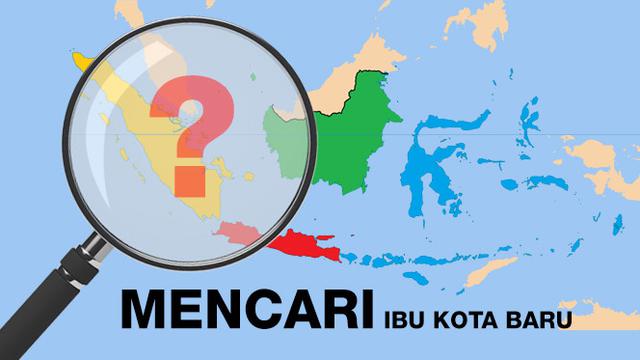A discourse on Indonesian capital city relocation is widely discussed again. This issue always arises in every leadership since the era of President Soekarno. The efforts made also show the seriousness even though it is uncertain whether realization will be done quickly and precisely. However, capital city relocation is not something new, considering that Indonesia had done it before. Historically, Indonesia has moved the capital city three times, to Yogyakarta (1946), Bukittinggi (1948), and Bireun (1948). The motive was the stability of the state as the Dutch at that time was still trying to take control of Indonesia. This condition is undoubtedly different from the current situation where the reasons are not only socio-economic but also geographic and historical aspects.
Some reasons regarding feasibility emerged as a rationalization for moving the center of government. Demographically, Jakarta is the most populous city, moreover with its migrants. Meanwhile, regarding transportation, chronic congestion is undoubtedly unavoidable. It happens due to the growing number of vehicle units each year, which is not followed by road development. Pollution in Jakarta is even ranked first in Southeast Asia. In addition to traffic jams, the problem of floods has not been resolved with annual loss Rp. 100 Trillion. Meanwhile, equal distribution of development is the next strong narrative so that it is not always Javanese centric. A new area is sought for the ideal location of the central government, and one of the qualifying regions is Kalimantan Island.
Through the perspective of international relations, the discourse of moving the capital city is no less important, considering that it will have an impact on various aspects. The capital city becomes the face and main gate of the country’s identity. It is the miniature of the country, so diplomatic representatives are certainly a further consideration. International will view the capital city and gives an impact. It can bring investments with a significant foreign exchange value. Thus, the affected areas will get the economic impact and welfare equality. In Southeast Asia, three countries have succeeded in moving their government capital cities, including the Philippines (Manila), Malaysia (Putra Jaya) and Myanmar (Naypyidaw). Even though their characteristics are different from Indonesia as an archipelago, and they cannot be a reference.
Based on international relations theory, the Theory of Green, a review on development is carried out based on environmental aspects. It can be a barrier as well as a challenge in managing the discourse as Kalimantan is one of the lungs of the world. On the other hand, an area of 100,000 ha is required for the development area. If Kalimantan is then chosen, there will be massive deforestation while the rate of deforestation in Kalimantan occurs annually, mainly for oil palm plantations. For this reason, forest land acquisition will be the next problem faced. There is also a risk of the forest fire.
Judging from its urgency, the separation between the central government and business center is undoubtedly an interesting study. It is considered as a preventative effort before Jakarta is “paralyzed,” so the impacts will not hit simultaneously. Meanwhile, the estimated cost needed to move the capital city could reach Rp.466 Trillion. Although there is a pattern of cooperation with the private sector, the capital city relocation is inseparable from the state budget funds in its execution. Even though the APBN budget funds are allocated to pay debts. As a result, the state owes to pay off debts. Supporting infrastructure should also be an additional job to support the center of government. The relocation process will also take a long time and be done periodically,
The total amount of the budget is considered wiser if it is allocated to other sectors with a similar goal, development equality. Thus the problem is no longer about feasibility, but management. Capital city relocation is not an urgent matter but is considered necessary. Therefore, if development equality is the main reason, there should be something with greater urgency, the issue of regional management. Local potentials can be pushed forward by the Central Government. To overcome the disparity in development, what is needed is moving the ministries to regions. This form of management is effective compared to moving the capital city, for example, the Ministry of Education and Culture in Yogyakarta, the LHK Ministry in Kalimantan or the Ministry of Tourism in Bali.
The discourse on capital city relocation has not fully guaranteed a conducive climate for the central government. The spotlight should not only focus on moving it but focuses on the problem of the capital city. Leaving Jakarta does not mean that several issues can be overcome. Some reasons stated above were floods, traffic jams, and development. However, Jokowi, while still serving as the Governor of Jakarta, once said that this issue would be easier to handle by the President. Hopefully, the relocation of the capital city is not interpreted as a solution to the flood. While the reason for development equality is undoubtedly more logical with regional management, then when the target is not achieved, the discourse can be continued as development equality.
The news about the capital city relocation was only a political discourse. It is interpreted as an issue for the public. As a long-term plan, this should be studied carefully. This careful planning can certainly be in line with Indonesia’s strategic steps; for example, Indonesia will become the number four economic power in the world by 2030. However, if the realization and execution will be done soon, then reviews of topography, geo-engineering, geomorphology, and analysis regarding environmental impacts should have been completed. The capital city relocation is not an urgent matter, although it should be taken into consideration. Thus, while fulfilling their political campaign promises, the government should boost the regional management rather than moving the capital city.





